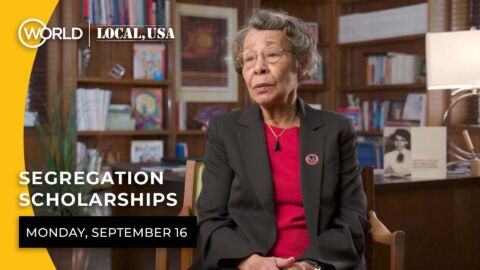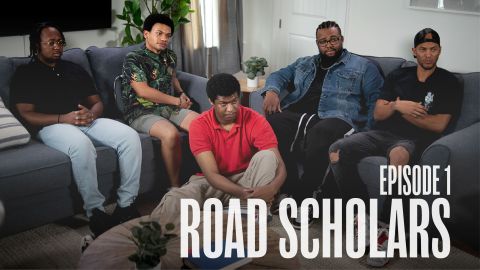Report Examines Structural Racism in New Jersey
It’s called “The Uncomfortable Truth.” A new report links chronic poverty to institutional racism. The Anti Poverty Network’s executive director Renee Koubiadis and board member reverend Charles Boyer recently joined NJTV News senior correspondent David Cruz to explain what they see as the effects of public policy on people still chasing the dream.
Cruz: The report is called, “The Uncomfortable Truth, Racism, Injustice and Poverty in New Jersey.” Renee Koubiadis is the executive director of the Anti-Poverty Network and Rev. Charles Boyer is pastor of AME Bethel in Woodbury and also a member of the APN board. So Renee, explain what you mean by structural racism.
Koubiadis: Sure. So, we are not talking about overt racism or we’re not blaming individuals. It’s really racism that exists in the structures within our state, within the institutions and I like to think of it as the kinds of things we don’t necessarily recognize in our everyday lives because they’ve just been there all along. And, unless we stop and actually look at them and study them, we don’t realize that they are structural racism.
Cruz: Where do you see these things manifest, reverend?
Boyer: We see these things manifest in multiple sectors, in housing, in criminal justice and in economics. We see it manifest itself in the education system, in the protections, the legal protections that residents have, so even in the environmental issues, we see it play out almost in every sector that we can think of.
Cruz: The report references racist results. What does that mean exactly?
Koubiadis: Sure, it just means lack of opportunities for people of color across our state. It means that we’re the third most segregated state in the nation right now. And, some of it has to do with policies both at the federal, state and local levels over the years that really have created this situation where people of color have less opportunity and barriers in place.
Cruz: So, does the report give facts and figures about where you see this the most?
Boyer: Yes, absolutely. The report in all of those various sectors, it really is focused on the results. One of the things in the crafting of this report, during that process everyone involved was really concerned with not to get caught up in individual racism. And, all of our discussion about race were often caught up in whether somebody says the “N” word, whether it’s this, whether it’s that. And, at the end of the day, the brilliance of the report is in the fact that we define racism in its most cogent and most potent attributes as the results, not so much as the intent. So, that’s what this report is based around — focusing on racism as a result-based piece rather than the overt racism. It’s more about the institution and how it manifested itself in all of the various sectors.
Cruz: So, you’re not just looking at the problem in this report, you’re also bringing up recommendations. Let’s talk about a few of those. What’s the top recommendation here, Renee?
Koubiadis: Well, there are five recommendations that are cross-cutting. They are requiring racial impact statements of all legislation and regulations in the state. Similar to financial impact statements that the Office of Legislation Services (OLS) does for the state for any legislation, they would be required to do racial impact statements to see the impact.
Cruz: It seems to me that if this report is correct, everything has a racial impact, yes?
Boyer: Yes, absolutely.
Cruz: The OLS, they’re just going to say yes, these are the impacts.
Boyer: Yes, and what’s really important about racial impact statements is that they give legislators and the community an opportunity to examine what the possible consequence is, the unintended consequences, that any piece of policy may have. And without having that data, oftentimes legislation may be well-intended, but often have very dangerous results.
Cruz: Right, these things that you don’t see, the unintended consequences. You also talk about re-establishing the Office of the Public Advocate, which had been through the Corzine administration.
Koubiadis: Yes, and we see that as a real key piece to helping people finding recourse when there is discrimination within the systems throughout our state. They can audit public agencies and really look at all of the pieces of the state.
Cruz: And, so this gives those affected an opportunity to have an actual advocate in the state government whose mission is to do that specifically.
Koubiadis: Yes, absolutely.
Cruz: It seems to me if we do a report like this in 10 years, that I’m afraid, and maybe you agree or disagree, that the results would not be much different without any serious radical change.
Boyer: Yes. Well, let me back up a little bit. The intent of this report is to put enough information in the hands of advocates and policy makers and all stakeholders so that we can avoid that very thing. So, that’s why there’s policy recommendations under each chapter. And so, what we’re hoping to do is use this as a tool so that all of us who are well-intentioned can move forward and actually do these things, take on that recommendation and not be in the same place. We do hope to make some progress.
Koubiadis: To that point, research just came out this week showing between 1983 and 2013 the wealth of blacks declined 75 percent. And the wealth of Latinos declined 50 percent over those 30 years. And it’s estimated that by the year 2024, whites will have 99 and 75 times the wealth of blacks and Latinos, respectively.
Cruz: Alright, Renee Koubiadis and Charles Boyer, thank you both very much for being with us.



